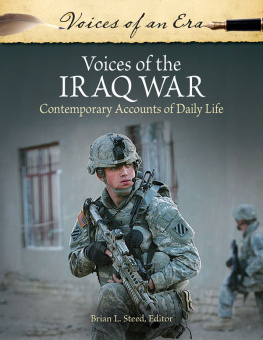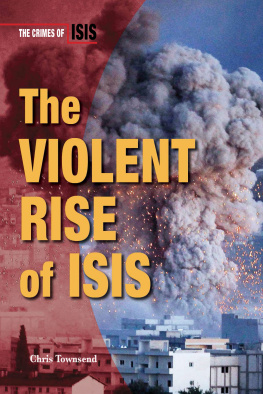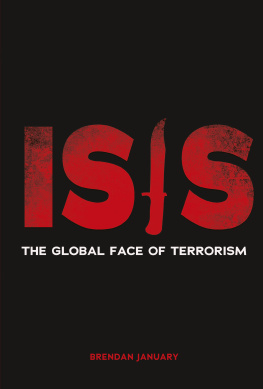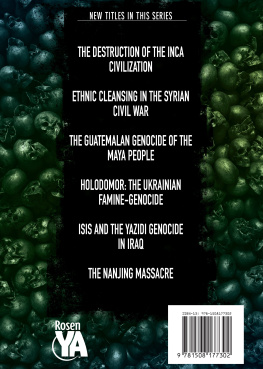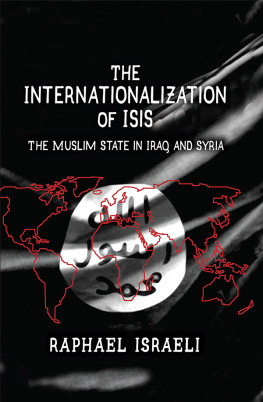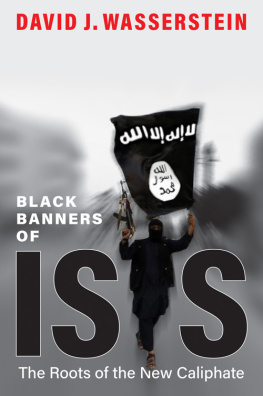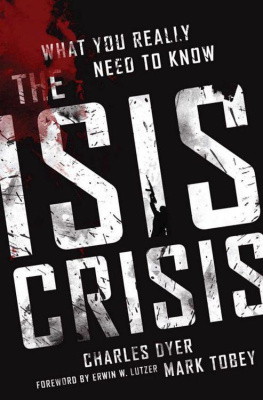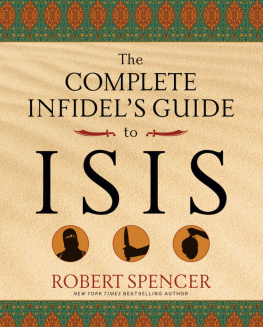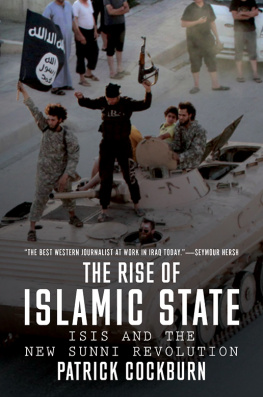ISIS
An Introduction and Guide to the Islamic State
Brian L. Steed

Copyright 2016 by ABC-CLIO, LLC
All rights reserved. No part of this publication may be reproduced, stored in a retrieval system, or transmitted, in any form or by any means, electronic, mechanical, photocopying, recording, or otherwise, except for the inclusion of brief quotations in a review, without prior permission in writing from the publisher.
Library of Congress Cataloging-in-Publication Data
Names: Steed, Brian L., author.
Title: ISIS: an introduction and guide to the Islamic State / Brian L. Steed.
Description: Santa Barbara : ABC-CLIO, LLC, 2016. | Includes bibliographical references and index.
Identifiers: LCCN 2016005650 | ISBN 9781440849862 (hard copy : alk. paper) | ISBN 9781440849879 (ebook)
Subjects: LCSH: IS (Organization)
Classification: LCC HV6433.I722 I8576 2016 | DDC 363.325dc23
LC record available at http://lccn.loc.gov/2016005650
ISBN: 978-1-4408-4986-2
EISBN: 978-1-4408-4987-9
20 19 18 17 16 1 2 3 4 5
This book is also available on the World Wide Web as an eBook.
Visit www.abc-clio.com for details.
ABC-CLIO
An Imprint of ABC-CLIO, LLC
ABC-CLIO, LLC
130 Cremona Drive, P.O. Box 1911
Santa Barbara, California 93116-1911
This book is printed on acid-free paper 
Manufactured in the United States of America
It is for us the living, rather, to be dedicated here to the unfinished work which they who fought here have thus far so nobly advanced. It is rather for us to be here dedicated to the great task remaining before usthat from these honored dead we take increased devotion to that cause for which they gave the last full measure of devotionthat we here highly resolve that these dead shall not have died in vain
Abraham Lincoln (Gettysburg Address, November 19, 1863)
To all those who taught me about the Middle East.
All opinions and suppositions expressed in this work are entirely those of the author and in no way reflect the positions, opinions, or policies of the United States Army, the United States Department of Defense, or any official or agency of the United States government.
Contents
Preface
The Islamic State represents a generational fight and the most fascinating development in the Middle East to happen in the last 35 years. The reference here is to 1979, the single most significant year in the Middle East in centuries. This was the year that saw a successful Islamic Revolution in Irana U.S.-backed ruler was toppled and Islam became the foundation for a modern state, reversing a trend of secularization prevalent in the Middle East since the 1700s. A mob of Iranian students captured the U.S. embassy in Tehran and held embassy personnel hostage for 444 days. A rescue attempt was launched though it failed in a fiery accident in the desert outside the Iranian capital. Of course later in that same year, the Soviet Union entered Afghanistan with military force. Many claim this as an invasion, but the Soviets were invited in by elements of the ruling government in Kabul. These events were broadcast every night on the major network news shows. In the same year, a group of radical Muslims led by a man claiming to be the Mahdi (a Muslim religious leadersee entry on Mahdi later in this book) stormed the Grand Mosque in Mecca and held that facility against an armed response from the Saudi security forces for several days. I remember the first two events as I watched them on the television every night like some sort of dark reality television series. I did not understand the implication of the failed hostage rescue attempt, but I remember watching the images of burning helicopters in the desert outside Tehran. I cannot recall seeing or hearing anything about the mosque seizure. I had no understanding that 1979 would set in motion thinkers and doers in the Middle East who would work toward a direct and painful collision and conflict with the United States. For me these events began a fascination with the Middle East that has been fulfilled through a dynamic set of personal experiences in the region.
Like most adult Americans, I know where I was and what I was doing on September 11, 2001, and also like most Americans I had never before heard of al-Qaeda. Within a year of that event, I was considered for promotion to the rank of major in the U.S. Army and I had the opportunity to select a different career specialty. I asked to be a Middle East Foreign Area Officer because I wanted to be a part of fighting those who had directly attacked my country. I understood then that to defeat our opponent we needed to understand them and we did not. I received my request and from 2004 until the present both my personal and professional interests have been focused on all things Middle East.
In my desire to understand the Middle East, I have been able to travel to numerous countries in the region and have lived in four of them. I began my experience in Jordan, where I served as a Jordanian Armed Forces officer for two-and-a-half years. I worked outside the city of Zarqa, Jordan, from which Abu Musab al-Zarqawi came. I regularly traveled into the city to visit with friends and acquaintances from church and work. I became familiar with the poverty and ignorance of most everyday people in Jordan and the ignorance and relative wealth of everyday people in the United States. My wife and I visited a Jordanian prison to see a member of our church congregation who had overstayed her visa. We brought her money because in a Jordanian prison the prisoners needed to purchase anything more than bread and plain yogurt. This was not the prison where al-Zarqawi was kept and indoctrinated, but it was a small insight into that world.
I served in Iraq on three occasionstwo trips of about 60 days or less and one for a full year2005, 2010 to 2011, and 2014 to 2015. In every case, I worked from the U.S. Embassy Annex in Baghdad, across the street from the U.S. Embassy, or in the U.S. Embassy compound itself. Unlike my time in Jordan where I knew the average citizen, was welcomed into their homes, and understood their concerns and thoughts; in Iraq, I was sheltered. I was able to speak with average Iraqis occasionally and I did get some understanding of the complexity of the country and what the U.S. occupation was doing to the society, but I cannot claim to have any similar comprehension of Iraq as I do of Jordan. I was also able to visit Syria several times, all in 2005, and in those brief four or five weeks I came to deeply appreciate the people and culture of one of the oldest civilizations in human history. Similar to Iraq, I was always a little sheltered with respect to the Syrian people and I do not really understand them as well as I would like. I did spend hours speaking with the common people and came to see something of the complexity there as well. I can say that I know what this war has cost the rest of the world and will cost us if Syria is lost to us permanently.
I finally came home to the United States in 2013 after living in the Middle East for eight-and-a-half years. I came back to teach military history at the U.S. Army Command and General Staff College at Fort Leavenworth, Kansas. When I arrived at the college, we had been at war in the Middle East for more than a decade and the curriculum had no mandatory courses on Middle East history, and only one elective was available on the subject. Since arriving we have added two more electives to communicate a lot of what is being shared in this book. To understand events in the Middle East, one needs to recognize that the roots of all events run deep into history. Nothing is isolated.
Next page

